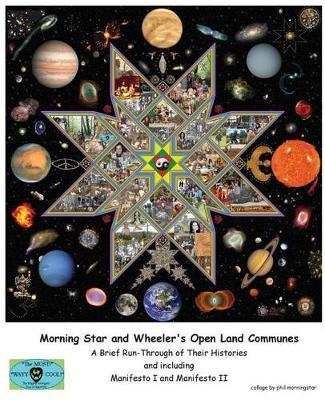Morning Star and Wheeler's Open Land Communes: A Brief Run-Through of Their Histories

Morning Star and Wheeler's Open Land Communes: A Brief Run-Through of Their Histories
A brief descrption of Morning Star and Wheeler Ranches in Sonoma County, California during the late sixties-early seventies, including the two Wheeler Ranch manifestos.
During the late sixties-early seventies, two open-door communal ranches opened their gates in Sonoma County, California. Nothing quite like them had ever existed before, and people came from all over the country to live there. Together, they allowed city folks and others to rediscover and practice a tribal, neo-primitive way of life that consumed less energy and offered more freedom than our regulated, consumption-oriented Great Society could give. Many of these settlers formed small families that migrated north to the 'Kingdom of New Albion, ' as we call the rural areas of Mendocino, Humboldt and other counties, where land was cheap and they could continue thieir new-found lifestyle unmolested.
At our two ranches, we experienced a magical eight years until Sonoma County authorities discovered that they could use the health and buildings codes punitively to bulldoze the houses, expel the inhabitants, and close them both down. Although Lou Gottlieb's Morning Star and Bill Wheeler's Sheep Ridge/Ahimsa differed in many respects, they both celebrated the freedom of each individual to 'do their thing, ' as long as no harm came to anyone or to the land. People who arrived, allergic to everything they had experienced, discovered the healing aspects of living on the earth with no concrete foundation under them, of building a home-made simple structure, and the pride that came from 'owning' their habitation, even if only a hut with a canvas roof.
But the change was too sudden for many neighbors, who feared that drug-crazed hippies would lead their children astray. In the case of each ranch, one politically powerful neighbor acted as the catalyst, and saw to it that the district attorney acted on their complaints. By 1973, it was all over, and the fines levied and legal fees for the defense ocquired ran into many thousands of dollars. Sonoma County's fees no dount were even greater for the abortive raids and harassments, many of which were found illegal and thrown out of court.
PRP: 93.00 Lei
Acesta este Prețul Recomandat de Producător. Prețul de vânzare al produsului este afișat mai jos.
83.70Lei
83.70Lei
93.00 LeiLivrare in 2-4 saptamani
Descrierea produsului
A brief descrption of Morning Star and Wheeler Ranches in Sonoma County, California during the late sixties-early seventies, including the two Wheeler Ranch manifestos.
During the late sixties-early seventies, two open-door communal ranches opened their gates in Sonoma County, California. Nothing quite like them had ever existed before, and people came from all over the country to live there. Together, they allowed city folks and others to rediscover and practice a tribal, neo-primitive way of life that consumed less energy and offered more freedom than our regulated, consumption-oriented Great Society could give. Many of these settlers formed small families that migrated north to the 'Kingdom of New Albion, ' as we call the rural areas of Mendocino, Humboldt and other counties, where land was cheap and they could continue thieir new-found lifestyle unmolested.
At our two ranches, we experienced a magical eight years until Sonoma County authorities discovered that they could use the health and buildings codes punitively to bulldoze the houses, expel the inhabitants, and close them both down. Although Lou Gottlieb's Morning Star and Bill Wheeler's Sheep Ridge/Ahimsa differed in many respects, they both celebrated the freedom of each individual to 'do their thing, ' as long as no harm came to anyone or to the land. People who arrived, allergic to everything they had experienced, discovered the healing aspects of living on the earth with no concrete foundation under them, of building a home-made simple structure, and the pride that came from 'owning' their habitation, even if only a hut with a canvas roof.
But the change was too sudden for many neighbors, who feared that drug-crazed hippies would lead their children astray. In the case of each ranch, one politically powerful neighbor acted as the catalyst, and saw to it that the district attorney acted on their complaints. By 1973, it was all over, and the fines levied and legal fees for the defense ocquired ran into many thousands of dollars. Sonoma County's fees no dount were even greater for the abortive raids and harassments, many of which were found illegal and thrown out of court.
Detaliile produsului











